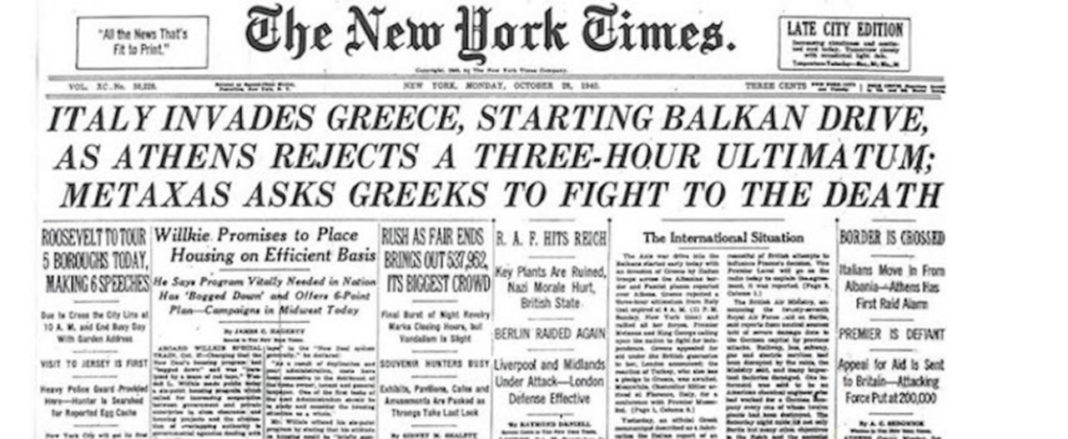Dean C. Lomis, Ph.D., Contributing Editor
October 28 is a solemn day in the history of Greece and Greek America, equivalent to December 7 and now September 11 for America, and in the history of humanity’s fight for Liberty. For it was the ‘Glory of Greece’ that illuminated the free world’s struggle because “right is more precious than peace,” especially “peace at any price.”
The gallant stand of the 1940-41 ‘Greek Epic’ which captured and inspired the imagination of the free world, and even its then-arch enemy: Nazi Germany, was not unique in the annals of world history. In fact, the significant factor of the Greek stand was that for at least the third time Greece’s heroic effort helped preserve Western Civilization, of which Greece is the chief architect.
The ancient Greek stand against the million-strong Persian army of antiquity, and victories first at Marathon and ten years later at Thermopylae and ultimately at Salamis, preserved the birth of Western Civilization. Had the Persians won, the future of Europe might not have had the free thought that it developed from the Greek “age of reason.” Rather, it might have been influenced by the despotic and militant Persian order, a mark of later Middle Eastern dogmas, including the Turks of today. Thus, the Greeks stood their ground, for they believed that “right is more precious than peace.”
Nearly a millennium and a half later, it happened again, as the Greeks of Byzantium withstood the Turkish onslaught repeatedly until falling on that fateful day in 1453. But the long struggle was maintained as the enslaved Greeks continued to harass the Turkish occupiers via “kleftais and amartoloi.” Thus, when in 1683 a rather weakened Ottoman Empire — but still in its zenith – arrived at the gates of Vienna, it was soundly defeated by the Polish King Sobieski. The goal of the Turks was to March to Paris, to burn it, in the systematic style of Turkish mentality.
A little over a century after Greek Independence, it happened again when Benito Mussolini’s Fascist forces invaded Greece on October 28, 1940 after receiving that famous declaration: “OXI!”
Greece’s modern “golden-age” epic was heralded across the free world in appreciation for its commitment, and as an inspiration to others in their struggle for Liberty. The significance of the Greek stand has been praised by friend and foe, except of course by the Turks.
The accolades that followed Greece’s gallant stand are too numerous to mention. However, it would be remiss not to mention at least few. The difficulty is: which to leave out! Here are some:
- U.S. author Rupert Hughes: “Once more the Greeks are giving their blood for the freedom of the world.”
- The famous American educator John Erskine: “Today, every American is a child of the Acropolis.”
- U.S. Undersecretary of State Sumner Welles: “The Greeks shattered forever the myth of Axis invincibility.”
- St. Louis Post Dispatch: “There speaks the Greece of Leonidas and the 300, the Greeks of Greece who never ask how many the enemy are but where they are.”
- Galveston Daily News: “No nation has excelled Greece in the valor of its defense against aggression.”
- Leigh White of CBS News: “It remained for those incurable optimists, those foolhardy patriots, the Greeks, to teach the world that it is better to fight against hopeless odds than to let the Axis swallow up homeland, spirit and national pride.”
- U.S. Senator Sam Rayburn: “We, and all the world, remember the heroic resistance of the Greeks. The overwhelming Nazi forces pushed the gallant Greeks back inch-by-inch until that fateful day when the symbol of tyranny, the Swastika, flew over the proud Parthenon. We all know much too-well that the lot of those brave people has since been starvation, agony and death.”
- British Prime Minister Winston Churchill: “When you speak of Greek warriors, don’t say Greeks fight like heroes but that heroes fight like Greeks.”
- Hitler’s Chief of Staff, Field Marshall Keitel, at the Nuremberg trials after World War II: “The unbelievable strong resistance of the Greeks delayed by two or more months the (German) attack against Russia and, if we did not have that long delay, the outcome of the War would have been different in the Eastern Front and in the War in general, and others would have been accused and would have been occupying this seat as defendants today.”
Perhaps the entire Greek Epic was summed best by *U.S. poet Edgar Allan Poe (1831): “To the Glory that was Greece,” followed by *U.S. poetess Fannie Hurst (1941): “No! Not ‘to the Glory that was Greece’ but to the Glory that IS Greece!”
If we analyze all these remarks, we will realize that each one tells: “right is more precious than peace.” This, then, is the relevancy of October 28 – OXI Day – to the preservation of Western Civilization, and the world must hear it again for its own benefit for, as the ancient Greek poet Pindar so wisely advised: “That which is silent dies.”
Perhaps one of the most fitting ways to commemorate October 28, 1940 is to couple it with October 28, 1886, thus making it a double holiday. Whereas the Greeks were summoned to fight for their Liberty on October 28, 1940, 54 years earlier, on October 28, 1886 the Statue of Liberty was unveiled and dedicated in New York City. Coincidental? Maybe?
The significant statement by former NATO Supreme Commander and late Army General Andrew Goodpaster may be the best testament of the meaning and value of OXI Day:
“As the years pass, it becomes more-and-more necessary to recall and record for the new generations just how the people of Greece, alone or with allies, gained and held for their country for a century and more the independence and democracy it possesses today – and how in one special moment in history Greece at heavy cost and sacrifices, and with great courage and determination played a pivotal role in World War II in defying the forces of tyranny and Axis aggression that were arrayed against not only Greece but the whole Western Civilization. It is an inspiring story.”
Let us observe this meaningful day with the dignity it deserves, and let us honor all those who fought and especially those who perished for the preservation of Liberty!








